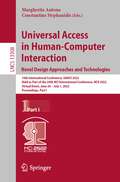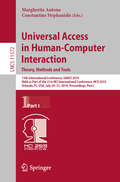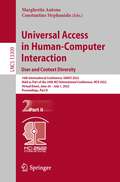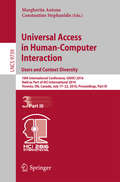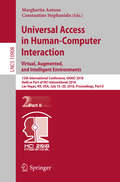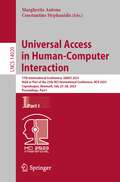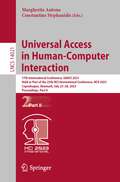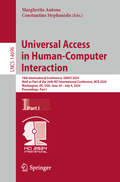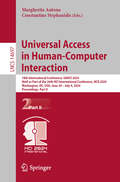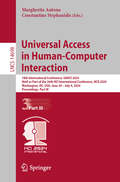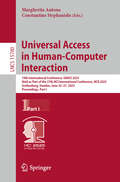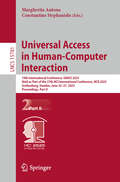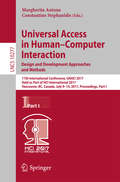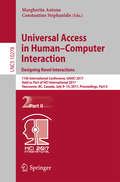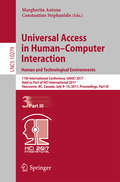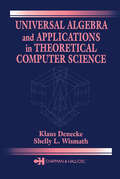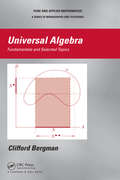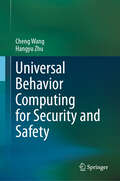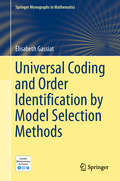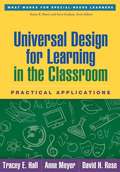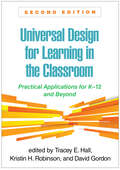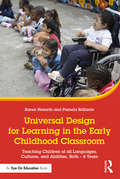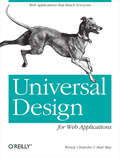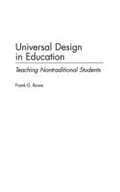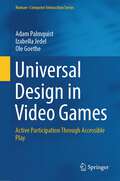- Table View
- List View
Universal Access in Human-Computer Interaction. Novel Design Approaches and Technologies: 16th International Conference, UAHCI 2022, Held as Part of the 24th HCI International Conference, HCII 2022, Virtual Event, June 26 – July 1, 2022, Proceedings, Part I (Lecture Notes in Computer Science #13308)
by Margherita Antona Constantine StephanidisThis two-volume set constitutes the refereed proceedings of the 16th International Conference on Universal Access in Human-Computer Interaction, UAHCI 2022, held as part of the 24th International Conference, HCI International 2022, held as a virtual event, in June-July 2022. A total of 1271 papers and 275 posters included in the 39 HCII 2022 proceedings volumes. UAHCI 2022 includes a total of 73 papers; they focus on topics related to universal access methods, techniques and practices, studies on accessibility, design for all, usability, UX and technology acceptance, emotion and behavior recognition for universal access, accessible media, access to learning and education, as well universal access to virtual and intelligent assistive environments.
Universal Access in Human-Computer Interaction. Theory, Methods and Tools: 13th International Conference, UAHCI 2019, Held as Part of the 21st HCI International Conference, HCII 2019, Orlando, FL, USA, July 26–31, 2019, Proceedings, Part I (Lecture Notes in Computer Science #11572)
by Margherita Antona Constantine StephanidisThis two-volume set constitutes the proceedings of the 13th International Conference on Universal Access in Human-Computer Interaction, UAHCI 2019, held as part of the 21st International Conference, HCI International 2019, which took place in Orlando, FL, USA, in July 2019. The total of 1274 papers and 209 posters included in the 35 HCII 2019 proceedings volumes was carefully reviewed and selected from 5029 submissions. UAHCI 2019 includes a total of 95 regular papers; they were organized in topical sections named: universal access theory, methods and tools; novel approaches to accessibility; universal access to learning and education; virtual and augmented reality in universal access; cognitive and learning disabilities; multimodal interaction; and assistive environments.
Universal Access in Human-Computer Interaction. User and Context Diversity: 16th International Conference, UAHCI 2022, Held as Part of the 24th HCI International Conference, HCII 2022, Virtual Event, June 26 – July 1, 2022, Proceedings, Part II (Lecture Notes in Computer Science #13309)
by Margherita Antona Constantine StephanidisThis two-volume set constitutes the refereed proceedings of the 16th International Conference on Universal Access in Human-Computer Interaction, UAHCI 2022, held as part of the 24th International Conference, HCI International 2022, held as a virtual event, in June-July 2022. A total of 1271 papers and 275 posters included in the 39 HCII 2022 proceedings volumes. UAHCI 2022 includes a total of 73 papers; they focus on topics related to universal access methods, techniques and practices, studies on accessibility, design for all, usability, UX and technology acceptance, emotion and behavior recognition for universal access, accessible media, access to learning and education, as well universal access to virtual and intelligent assistive environments.
Universal Access in Human-Computer Interaction. Users and Context Diversity
by Margherita Antona Constantine StephanidisThe three-volume set LNCS 8009-8011 constitutes the refereed proceedings of the 7th International Conference on Universal Access in Human-Computer Interaction, UAHCI 2013, held as part of the 15th International Conference on Human-Computer Interaction, HCII 2013, held in Las Vegas, USA in July 2013, jointly with 12 other thematically similar conferences. The total of 1666 papers and 303 posters presented at the HCII 2013 conferences was carefully reviewed and selected from 5210 submissions. These papers address the latest research and development efforts and highlight the human aspects of design and use of computing systems. The papers accepted for presentation thoroughly cover the entire field of human-computer interaction, addressing major advances in knowledge and effective use of computers in a variety of application areas. The total of 230 contributions included in the UAHCI proceedings were carefully reviewed and selected for inclusion in this three-volume set. The 78 papers included in this volume are organized in the following topical sections: age-related issues, human vision in universal access, emotions and persuasion in universal access, design for autistic spectrum disorders, cognitive issues for universal access, universal access to the Web and social communities.
Universal Access in Human-Computer Interaction. Virtual, Augmented, and Intelligent Environments: 12th International Conference, UAHCI 2018, Held as Part of HCI International 2018, Las Vegas, NV, USA, July 15-20, 2018, Proceedings, Part II (Lecture Notes in Computer Science #10908)
by Margherita Antona Constantine StephanidisThis two-volume set LNCS 10907 and 10908 constitutes the refereed proceedings of the 12th International Conference on Universal Access in Human-Computer Interaction, UAHCI 2018, held as part of HCI International 2018 in Las Vegas, NV, USA, in July 2018.The total of 1170 papers and 195 posters included in the 30 HCII 2018 proceedings volumes was carefully reviewed and selected from 4373 submissions.The 48 papers presented in this volume were organized in topical sections named: virtual and augmented reality for universal access; intelligent assistive environments; and access to the web, social media, education, culture and social innovation.
Universal Access in Human-Computer Interaction: 17th International Conference, UAHCI 2023, Held as Part of the 25th HCI International Conference, HCII 2023, Copenhagen, Denmark, July 23–28, 2023, Proceedings, Part I (Lecture Notes in Computer Science #14020)
by Margherita Antona Constantine StephanidisThis two-volume set constitutes the refereed proceedings of the 17th International Conference on Universal Access in Human-Computer Interaction, UAHCI 2023, held as part of the 25th International Conference, HCI International 2023, in Copenhagen, Denmark, during July 23-28, 2023. The total of 1578 papers and 396 posters included in the HCII 2022 proceedings was carefully reviewed and selected from 7472 submissions. The UAHCI 2023 proceedings were organized in the following topical sections: Part I: Design for All Methods, Tools and Practice; Interaction Techniques, Platforms and Metaphors for Universal Access; Understanding the Universal Access User Experience; and Designing for Children with Autism Spectrum Disorders. Part II: Universal Access to XR; Universal Access to Learning and Education; Assistive Environments and Quality of Life Technologies.
Universal Access in Human-Computer Interaction: 17th International Conference, UAHCI 2023, Held as Part of the 25th HCI International Conference, HCII 2023, Copenhagen, Denmark, July 23–28, 2023, Proceedings, Part II (Lecture Notes in Computer Science #14021)
by Margherita Antona Constantine StephanidisThis two-volume set constitutes the refereed proceedings of the 17th International Conference on Universal Access in Human-Computer Interaction, UAHCI 2023, held as part of the 25th International Conference, HCI International 2023, in Copenhagen, Denmark, during July 23-28, 2023. The total of 1578 papers and 396 posters included in the HCII 2022 proceedings was carefully reviewed and selected from 7472 submissions. The UAHCI 2023 proceedings were organized in the following topical sections: Part I: Design for All Methods, Tools and Practice; Interaction Techniques, Platforms and Metaphors for Universal Access; Understanding the Universal Access User Experience; and Designing for Children with Autism Spectrum Disorders. Part II: Universal Access to XR; Universal Access to Learning and Education; Assistive Environments and Quality of Life Technologies.
Universal Access in Human-Computer Interaction: 18th International Conference, UAHCI 2024, Held as Part of the 26th HCI International Conference, HCII 2024, Washington, DC, USA, June 29 – July 4, 2024, Proceedings, Part I (Lecture Notes in Computer Science #14696)
by Margherita Antona Constantine StephanidisThis three-volume set LNCS 14696-14698 constitutes the refereed proceedings of the 18th International Conference on Universal Access in Human-Computer Interaction, UAHCI 2024, held as part of the 26th International Conference, HCI International 2024, in Washington, DC, USA, during June 29 – July 4, 2024. The total of 1271 papers and 309 posters included in the HCII 2024 proceedings was carefully reviewed and selected from 5108 submissions. The UAHCI 2024 proceedings were organized in the following topical sections: Part I: User Experience Design and Evaluation for Universal Access; AI for Universal Access. Part II: Universal Access to Digital Services; Design for Cognitive Disabilities; Universal Access to Virtual and Augmented Reality. Part III: Universal Access to Learning and Education; Universal Access to Health and Wellbeing; Universal Access to Information and Media.
Universal Access in Human-Computer Interaction: 18th International Conference, UAHCI 2024, Held as Part of the 26th HCI International Conference, HCII 2024, Washington, DC, USA, June 29 – July 4, 2024, Proceedings, Part II (Lecture Notes in Computer Science #14697)
by Margherita Antona Constantine StephanidisThis three-volume set LNCS 14696-14698 constitutes the refereed proceedings of the 18th International Conference on Universal Access in Human-Computer Interaction, UAHCI 2024, held as part of the 26th International Conference, HCI International 2024, in Washington, DC, USA, during June 29 – July 4, 2024. The total of 1271 papers and 309 posters included in the HCII 2024 proceedings was carefully reviewed and selected from 5108 submissions. The UAHCI 2024 proceedings were organized in the following topical sections: Part I: User Experience Design and Evaluation for Universal Access; AI for Universal Access. Part II: Universal Access to Digital Services; Design for Cognitive Disabilities; Universal Access to Virtual and Augmented Reality. Part III: Universal Access to Learning and Education; Universal Access to Health and Wellbeing; Universal Access to Information and Media.
Universal Access in Human-Computer Interaction: 18th International Conference, UAHCI 2024, Held as Part of the 26th HCI International Conference, HCII 2024, Washington, DC, USA, June 29 – July 4, 2024, Proceedings, Part III (Lecture Notes in Computer Science #14698)
by Margherita Antona Constantine StephanidisThis three-volume set LNCS 14696-14698 constitutes the refereed proceedings of the 18th International Conference on Universal Access in Human-Computer Interaction, UAHCI 2024, held as part of the 26th International Conference, HCI International 2024, in Washington, DC, USA, during June 29 – July 4, 2024. The total of 1271 papers and 309 posters included in the HCII 2024 proceedings was carefully reviewed and selected from 5108 submissions. The UAHCI 2024 proceedings were organized in the following topical sections: Part I: User Experience Design and Evaluation for Universal Access; AI for Universal Access. Part II: Universal Access to Digital Services; Design for Cognitive Disabilities; Universal Access to Virtual and Augmented Reality. Part III: Universal Access to Learning and Education; Universal Access to Health and Wellbeing; Universal Access to Information and Media.
Universal Access in Human-Computer Interaction: 19th International Conference, UAHCI 2025, Held as Part of the 27th HCI International Conference, HCII 2025, Gothenburg, Sweden, June 22–27, 2025, Proceedings, Part I (Lecture Notes in Computer Science #15780)
by Margherita Antona Constantine StephanidisThis 2-volume set LNCS 15780-15781 constitutes the refereed proceedings of the 19th International Conference on Universal Access in Human-Computer Interaction, UAHCI 2025, held as part of the 27th International Conference, HCI International 2025, in Gothemburg, Sweden during June 22nd to 27th, 2025. The total of 1430 papers and 355 posters included in the HCII 2025 proceedings was carefully reviewed and selected from 7972 submissions. The two volumes cover topics as follows: Universal Access Theory and Practice Multimodality and UI Adaptation Universal Access and AI Inclusive Virtual and Augmented Reality Inclusive Learning and Playing
Universal Access in Human-Computer Interaction: 19th International Conference, UAHCI 2025, Held as Part of the 27th HCI International Conference, HCII 2025, Gothenburg, Sweden, June 22–27, 2025, Proceedings, Part II (Lecture Notes in Computer Science #15781)
by Margherita Antona Constantine StephanidisThis 2-volume set LNCS 15780-15781 constitutes the refereed proceedings of the 19th International Conference on Universal Access in Human-Computer Interaction, UAHCI 2025, held as part of the 27th International Conference, HCI International 2025, in Gothemburg, Sweden during June 22nd to 27th, 2025. The total of 1430 papers and 355 posters included in the HCII 2025 proceedings was carefully reviewed and selected from 7972 submissions. The two volumes cover topics as follows: Universal Access Theory and Practice Multimodality and UI Adaptation Universal Access and AI Inclusive Virtual and Augmented Reality Inclusive Learning and Playing
Universal Access in Human–Computer Interaction. Design and Development Approaches and Methods
by Margherita Antona Constantine StephanidisThe three-volume set LNCS 10277-10279 constitutes the refereed proceedings of the11th International Conference on Universal Access in Human-Computer Interaction, UAHCI 2017, held as part of the 19th International Conference on Human-Computer Interaction, HCII 2017, in Vancouver, BC, Canada in July 2017, jointly with 14 other thematically similar conferences. The total of 1228 papers presented at the HCII 2017 conferences were carefully reviewed and selected from 4340 submissions. The papers included in the three UAHCI 2017 volumes address the following major topics: Design for All Methods and Practice; Accessibility and Usability Guidelines and Evaluation; User and Context Modelling and Monitoring and Interaction Adaptation; Design for Children; Sign Language Processing; Universal Access to Virtual and Augmented Reality; Non Visual and Tactile Interaction; Gesture and Gaze-Based Interaction; Universal Access to Health and Rehabilitation; Universal Access to Education and Learning; Universal Access to Mobility; Universal Access to Information and Media; and Design for Quality of Life Technologies.
Universal Access in Human–Computer Interaction. Designing Novel Interactions
by Margherita Antona Constantine StephanidisThe three-volume set LNCS 10277-10279 constitutes the refereed proceedings of the11th International Conference on Universal Access in Human-Computer Interaction, UAHCI 2017, held as part of the 19th International Conference on Human-Computer Interaction, HCII 2017, in Vancouver, BC, Canada in July 2017, jointly with 14 other thematically similar conferences. The total of 1228 papers presented at the HCII 2017 conferences were carefully reviewed and selected from 4340 submissions. The papers included in the three UAHCI 2017 volumes address the following major topics: Design for All Methods and Practice; Accessibility and Usability Guidelines and Evaluation; User and Context Modelling and Monitoring and Interaction Adaptation; Design for Children; Sign Language Processing; Universal Access to Virtual and Augmented Reality; Non Visual and Tactile Interaction; Gesture and Gaze-Based Interaction; Universal Access to Health and Rehabilitation; Universal Access to Education and Learning; Universal Access to Mobility; Universal Access to Information and Media; and Design for Quality of Life Technologies.
Universal Access in Human–Computer Interaction. Human and Technological Environments
by Margherita Antona Constantine StephanidisThe three-volume set LNCS 10277-10279 constitutes the refereed proceedings of the11th International Conference on Universal Access in Human-Computer Interaction, UAHCI 2017, held as part of the 19th International Conference on Human-Computer Interaction, HCII 2017, in Vancouver, BC, Canada in July 2017, jointly with 14 other thematically similar conferences. The total of 1228 papers presented at the HCII 2017 conferences were carefully reviewed and selected from 4340 submissions. The papers included in the three UAHCI 2017 volumes address the following major topics: Design for All Methods and Practice; Accessibility and Usability Guidelines and Evaluation; User and Context Modelling and Monitoring and Interaction Adaptation; Design for Children; Sign Language Processing; Universal Access to Virtual and Augmented Reality; Non Visual and Tactile Interaction; Gesture and Gaze-Based Interaction; Universal Access to Health and Rehabilitation; Universal Access to Education and Learning; Universal Access to Mobility; Universal Access to Information and Media; and Design for Quality of Life Technologies.
Universal Algebra and Applications in Theoretical Computer Science
by Klaus Denecke Shelly L. WismathOver the past 20 years, the emergence of clone theory, hyperequational theory, commutator theory and tame congruence theory has led to a growth of universal algebra both in richness and in applications, especially in computer science. Yet most of the classic books on the subject are long out of print and, to date, no other book has integrated these theories with the long-established work that supports them. Universal Algebra and Applications in Theoretical Computer Science introduces the basic concepts of universal algebra and surveys some of the newer developments in the field. The first half of the book provides a solid grounding in the core material. A leisurely pace, careful exposition, numerous examples, and exercises combine to form an introduction to the subject ideal for beginning graduate students or researchers from other areas. The second half of the book focuses on applications in theoretical computer science and advanced topics, including Mal'cev conditions, tame congruence theory, clones, and commutators. The impact of the advances in universal algebra on computer science is just beginning to be realized, and the field will undoubtedly continue to grow and mature. Universal Algebra and Applications in Theoretical Computer Science forms an outstanding text and offers a unique opportunity to build the foundation needed for further developments in its theory and in its computer science applications.
Universal Algebra: Fundamentals and Selected Topics
by Clifford BergmanStarting with the most basic notions, Universal Algebra: Fundamentals and Selected Topics introduces all the key elements needed to read and understand current research in this field. Based on the author's two-semester course, the text prepares students for research work by providing a solid grounding in the fundamental constructions and concepts o
Universal Behavior Computing for Security and Safety
by Cheng Wang Hangyu ZhuThis book presents advanced solutions for integrated security and safety based on universal behavior computing. It provides a comprehensive survey of recent representative research in the field of universal behavior computing, including a review of traditional behavior analysis methods, an introduction to emerging key technologies and frameworks for building behavior models, and a discussion on further opportunities for utilizing behavior simulation in future research. This book aims to provide a comprehensive and promising perspective for behavior computing-based security and safety solutions. By examining common weaknesses in typical real-world cases, it offers representative examples for a wide range of practical applications. It can provide valuable insights for both researchers and professionals in the field.
Universal Coding and Order Identification by Model Selection Methods (Springer Monographs in Mathematics)
by Élisabeth Gassiat Anna Ben-HamouThe purpose of these notes is to highlight the far-reaching connections between Information Theory and Statistics. Universal coding and adaptive compression are indeed closely related to statistical inference concerning processes and using maximum likelihood or Bayesian methods. The book is divided into four chapters, the first of which introduces readers to lossless coding, provides an intrinsic lower bound on the codeword length in terms of Shannon’s entropy, and presents some coding methods that can achieve this lower bound, provided the source distribution is known. In turn, Chapter 2 addresses universal coding on finite alphabets, and seeks to find coding procedures that can achieve the optimal compression rate, regardless of the source distribution. It also quantifies the speed of convergence of the compression rate to the source entropy rate. These powerful results do not extend to infinite alphabets. In Chapter 3, it is shown that there are no universal codes over the class of stationary ergodic sources over a countable alphabet. This negative result prompts at least two different approaches: the introduction of smaller sub-classes of sources known as envelope classes, over which adaptive coding may be feasible, and the redefinition of the performance criterion by focusing on compressing the message pattern. Finally, Chapter 4 deals with the question of order identification in statistics. This question belongs to the class of model selection problems and arises in various practical situations in which the goal is to identify an integer characterizing the model: the length of dependency for a Markov chain, number of hidden states for a hidden Markov chain, and number of populations for a population mixture. The coding ideas and techniques developed in previous chapters allow us to obtain new results in this area. This book is accessible to anyone with a graduate level in Mathematics, and will appeal to information theoreticians and mathematical statisticians alike. Except for Chapter 4, all proofs are detailed and all tools needed to understand the text are reviewed.
Universal Design for Learning in the Classroom
by Anne Meyer Tracey HallClearly written and well organized, this book shows how to apply the principles of universal design for learning (UDL) across all subject areas and grade levels. The editors and contributors describe practical ways to develop classroom goals, assessments, materials, and methods that use UDL to meet the needs of all learners. Specific teaching ideas are presented for reading, writing, science, mathematics, history, and the arts, including detailed examples and troubleshooting tips. Particular attention is given to how UDL can inform effective, innovative uses of technology in the inclusive classroom.
Universal Design for Learning in the Classroom: Practical Applications for K-12 and Beyond
by David Gordon Tracey E. Hall Kristin H. RobinsonThe Universal Design for Learning (UDL) framework has grown from its origins in special education to being widely used to support all students, making the fully rewritten second edition of this indispensable guide more relevant than ever. Filled with practical, vivid examples and tips, the book demonstrates the power of UDL when applied to particular content areas. Specific teaching ideas are presented for literacy, STEM, project-based learning, career and technical education, and the arts. The editors and contributors describe practical ways to create thriving learning environments that use UDL to meet diverse learners' needs. New to This Edition *Entirely new content. *Coverage expanded from elementary and middle grades to secondary and beyond. *Innovative approaches embracing the growth of UDL and the ubiquity of digital technologies in today&’s classrooms. *Spotlight on issues of equity and inclusion. *Chapters on antiracism, social–emotional learning, career and technical education, journey mapping, and curriculum design. *Compelling discussions of advances in UDL principles and research directions.
Universal Design for Learning in the Early Childhood Classroom: Teaching Children of all Languages, Cultures, and Abilities, Birth – 8 Years
by Karen Nemeth Pamela BrillanteUniversal Design for Learning in the Early Childhood Classroom focuses on proactively designing PreK through Grade 3 classroom environments, instruction, and assessments that are flexible enough to ensure that teachers can accommodate the needs of all the students in their classrooms. Typically developing students, gifted students, students who are impacted by poverty, children who speak multiple languages or have a home language that is different than the classroom language, and students with identified or potential developmental or learning disabilities are all covered within this highly practical, easy-to-use guide to UDL in the early years.
Universal Design for Web Applications: Web Applications That Reach Everyone
by Matt May Wendy ChisholmUniversal Design for Web Applications teaches you how to build websites that are more accessible to people with disabilities and explains why doing so is good business. It takes more work up front, but the potential payoff is huge -- especially when mobile users need to access your sites.You'll discover how to use standards-based web technologies -- such as XHTML, CSS, and Ajax, along with video and Flash -- to develop applications for a wide range of users and a variety of devices, including the mobile Web. You'll also learn specifics about this target audience, especially the key over-50 age group, whose use of the Web is rapidly growing.With this book, you will:Learn the importance of metadata and how it affects images, headings, and other design elementsBuild forms that accommodate cell phones, screen readers, word prediction, and moreCreate designs using color and text that are effective in a variety of situationsConstruct tables that present information without spatial cuesDesign Ajax-driven social networking applications that people with disabilities can accessProvide audio with transcriptions and video that includes captions and audio descriptionsDiscover assistive technology support for Rich Internet Application technologies such as Flash, Flex, and SilverlightUniversal Design for Web Applications provides you with a roadmap to help you design easy-to-maintain web applications that benefit a larger audience.
Universal Design in Education: Teaching Nontraditional Students
by Frank G. BoweIntended to be used as a handbook, this volume provides teachers of all grades and programs with ways of designing and delivering instruction that responds to the needs of diverse students, including those with disabilities, different learning styles, scheduling difficulties, and of ethnic and racial minority cultures. Bowe (special education, Hofstra U. ) outlines seven educational principles basic to the concept of universal design and addresses web site accessibility.
Universal Design in Video Games: Active Participation Through Accessible Play (Human–Computer Interaction Series)
by Ole Goethe Adam Palmquist Izabella JedelAs participation in game related activities increases around the world and across a larger part of the population, it is obvious that games are not just an entertainment medium for children or young people. Games can be used to accomplish different purposes for different groups of people in society. Developing a universal designed game involves more than adding a cast of diverse characters. Games with universal design, at their core, are experiences that are designed from the ground up to be accessible to everyone – through mechanics, options, and user experience. This book explains the meaning and need for universal design in video games and sheds light on important disciplines. Researchers define a universal designed game as a video game that actively welcomes all players. When players connect authentically with a video game, they’re much more likely to engage with the content. Conversely, when players can’t physically play a game, or don’t see characters that look like them, they feel isolated and miss out on beneficial opportunities to learn and collaborate. Universal design maximizes the impact of playing games, for instance, by ensuring that they’re accessible, empowering and representative for every participant.
